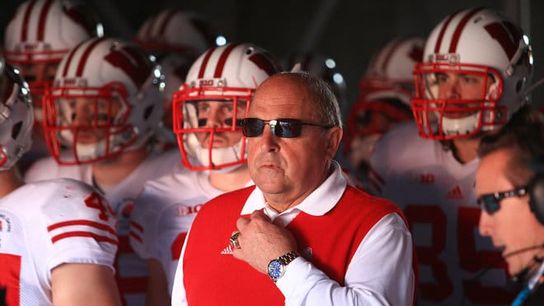The situation in Madison is... unique. Because Barry Alvarez ascended from a Hall of Fame coaching career to the athletics director chair, a chair he's sat in for a dozen years ago. And because, well, Barry is Barry.
Following the departure of Dave Aranda and the hiring of Justin Wilcox as his replacement, Alvarez penned a letter on Wisconsin's athletics site responding to the criticism he's received on the perception the Badgers don't pay their assistant coaches commensurate with Wisconsin's status as a major football program.
Let's dive in:
Much has been made about salaries for assistant coaches during this offseason. I am very aware of where we rank both in the Big Ten and nationally as far as salary is concerned. I can't speak for what other schools do, but I know my responsibility is to do what's best for Wisconsin and our student-athletes.
According to the USA Today salary database, Wisconsin ranked 40th nationally in 2015 with an assistant salary pool of $2.632 million. That's behind Michigan, Ohio State, Nebraska, Michigan State, Iowa, Minnesota and Maryland in the Big Ten and such football powers as Central Florida, Colorado and Oregon State nationally. Safe to say the athletics directors at the other 39 institutions care as much about their student-athletes as Alvarez does his.
Having been in the profession for as long as I was, and now viewing it as an administrator, I know that there is always a lot of movement among football coaches each year. It has been going on for as long as I can remember. And different coaches change jobs for different reasons. No two situations are exactly the same. It's too simplistic to say someone moved from one job to another for one reason. Now, I'm not naïve to the fact that money is one of the factors that coaches consider when taking a job. But there are a number of things a coach considers when making the decision to move his family and we don't begrudge anyone for making a decision that they think is in their family's best interests.
However, the convenient narrative that has been forwarded about Wisconsin not paying its assistant coaches enough, and that causing us to lose quality coaches, simply is not true. We have had a lot of coaching turnover recently but it has not been caused by money. In fact, even if you look as far back as 2000, you would be hard-pressed to find an assistant coach other than Dave Aranda who left for a similar position at another school and for a significant raise. The large majority of changes have either been coaches moving up the coaching ladder (jumping from college to the NFL, position coaches becoming coordinators or coordinators becoming head coaches) or coaches who were not retained due to a change at our head coach position.
That's all true, but it gracefully glosses over the fact Bret Bielema left a head coaching job at Wisconsin that paid him $2.6 million annually for the same job at Arkansas that paid $3.2 million. In addition to his own $600,000 raise, Bielema in part because too many of his assistants made a similar calculation of his own. “You want your assistants to move up,” Bielema said in 2013. “But you want it to be a hard decision. You want them to only be willing to leave if they’re walking into a dream situation. You don’t want money to ever be a factor.”
And while Gary Andersen's departure was more complicated than Bielema's, he netted a raise from $2.3 million to $2.45 million when leaving six-Rose-Bowls-in-the-last-22-years Wisconsin for no-Rose-Bowls-since-1957 Oregon State.
Wisconsin is not the only place that has lost assistant coaches. If you look around the country, there is constant movement within the profession. Among the Power Five conferences, more than half of the 64 schools had a change in either their offensive or defensive coordinator, or both, this year. In both the Big Ten and SEC this year, nine of the 14 schools will have at least one new coordinator. Everyone loses good coaches. The question is, how do you sustain success when that happens? We have a pretty good track record around here of being able to do just that.
This is a good place to be. I know that because I've been here for more than 25 years. But I also know that because of the number of calls I get from highly-respected people within the profession whenever we have an opening. People want to work here. And we've been able to hire good coaches. But much like recruiting student-athletes, we need to look for the best "fit" when hiring coaches. Just because someone is a "hot" name or a website ranks them as a five-star recruit, doesn't necessarily mean they will be successful here.
Again, a lot of wisdom there. But what Alvarez is saying, and what he goes on to say if you read the entire letter, can only be seen when looking between the lines: "Get used to it."
The final two sentences of the second paragraph lay it all out. Just as Michigan and Ohio State will have more talented rosters, they'll also continue to pay their coaches more. It's a formula that's been successful for Wisconsin over the past 25 years.
And it's not going to change, for better or worse.
